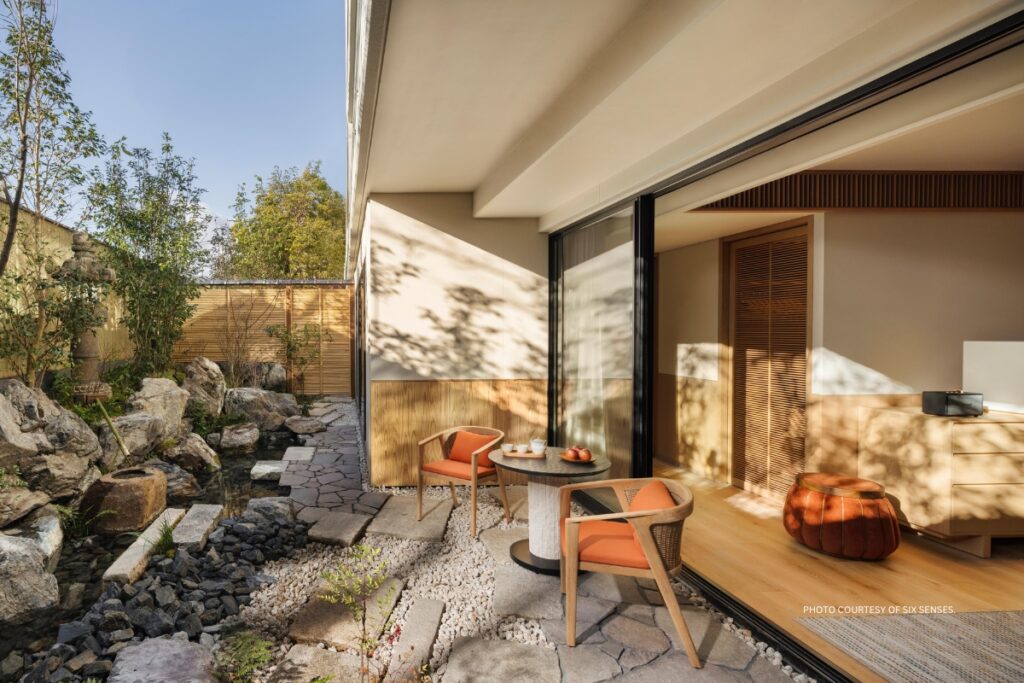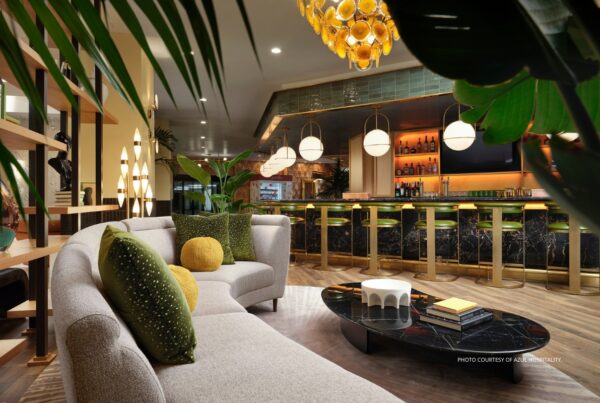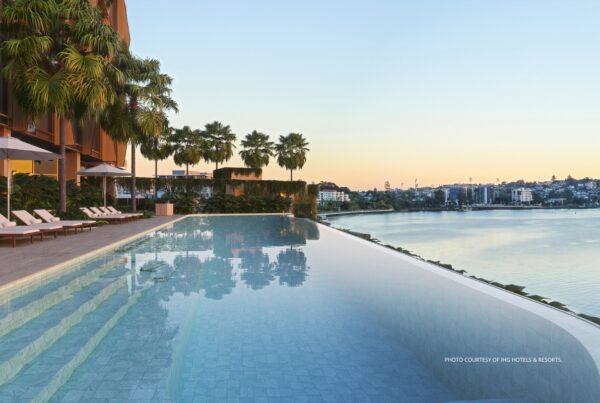Six Senses Kyoto opened this week, marking the brand’s entry into Japan.
Conveniently located among the iconic heritage shrines and palaces within the ancient capital, the urban property offers 81 guestrooms and suites, a Six Senses spa, onsite restaurants, and a bar.
The design of Six Senses Kyoto draws inspiration from the Heian Period (794-1185), when Heian-kyo (now Kyoto) was the capital of Japan. Considered a golden age of art and culture, the period gave birth to the concept of “Miyabi” – courtly elegance. This heritage is given a modern interpretation in the hotel. The lobby artwork sets the tone with a folding screen featuring 504 hand-crafted Kyoto-made Rakuyaki tiles. These symbolize the silhouette of the sacred Mount Kurama, one of the legendary settings of the Tale of Genji and the birthplace of Reiki healing. Opposite the folding screen is a whimsical art piece which is a modern take on “Chōjū-giga” (Scrolls of Frolicking Animals), believed to be the very first manga (Japanese graphic novels) in the nation’s history.
The contrasting artwork sets the stage for the hotel’s blend of history, artistry, playfulness and emotional hospitality. Guests are also connected to nature through the biophilic design of Six Senses Kyoto, which is evident in the use of wood and natural materials, as well as the meandering paths through inner Japanese gardens.
The design narrative extends to the guestrooms and suites. Specialty suites, from the Premier Suite Garden with a private Japanese courtyard to the more than 2,560-square-foot Three Bedroom Penthouse Suite, offer extended space for reconnection. All bedrooms feature Sleep With Six Senses, which aids sound sleep through the use of bespoke organic mattresses, temperature regulating pillows, duvets, and organic cotton sheets.
Inspired by Kyoto’s Zen philosophy, Six Senses Spa integrates traditional healing techniques with modern science. Highlights include the Kyoto-exclusive Ah-un treatment, which symbolizes the pursuit of inner peace, balance, and awakening in Zen through a series of rituals and harmonizing body and sound therapies. Watsu (aquatic bodywork) relieves any tension of the body and the mind through hydrotherapeutic moves and stretches in the city’s only dedicated pool for the treatment. For guests looking for help recovering from their travels, the adjacent Biohack Recovery Lounge is equipped with state-of-the-art recovery devices such as compression therapy.
Guided by the Eat With Six Senses ethos, the food and beverage offerings at Six Senses Kyoto take guests on a journey through the ancient Japanese calendar. Sekki, the all-day dining restaurant, features hyper-seasonal weekly menus and drinks inspired by Japan’s 24 solar terms. Executive Chef Hiroki Shishikura’s menu highlights a veg-forward lineup celebrating artisanal local and sustainable ingredients, complemented by a carefully sourced meat and seafood selection. The nose-to-tail and root-to-stem cooking principles ensure all menus are sustainable.
The adjacent Café Sekki offers a selection of fresh brews, craft teas, homemade kombucha, healthy juices, and guilt-free sweets and pastries using only natural ingredients and traditional fermentation techniques. Nine Tails, the speakeasy cocktail bar, serves cocktails – alcoholic and non-alcoholic – crafted from artisanal condiments and homemade syrup and cordials.
Sustainability remains the core of the Six Senses brand’s values and operations and is clear from the eco-centric design and construction of Six Senses Kyoto to its operational practices and local contributions. Guests can join a sustainability tour, explore interactive workshops at the Earth Lab, or create natural body products at the Alchemy Bar, all designed to foster a deeper understanding and connection with local culture and sustainable practices.
The dedicated Sustainability Fund, supported by 0.5 percent of the hotel’s revenue, will support locally based organizations – Biotope Network Kyoto and Council for Kyoto Traditional Forest Culture – in regenerating, conserving, and educating younger generations on forestry revitalization and its cultural value.
















